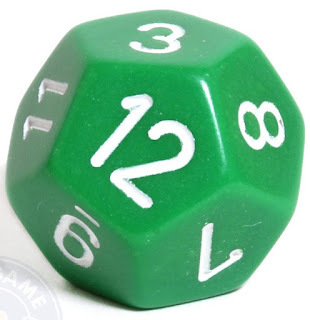The Shape of the Heavens
Sing, Muse, of the noble dodecahedron, twelve-faced and true,
So oft neglected in the clattering chorus of polyhedral dice!
Raise now a hymn to the least loved of gaming’s solids.
Pity the poor d12! Always the bridesmaid, never the bride. The d20, that lumbering golf ball of chance, sees far more use, while even the d4, a caltrop in disguise, is remembered (if only by the soles of our feet). But the d12? Forgotten. Neglected. Dare I say underappreciated?
Yet, what a die it is! Twelve equal pentagonal faces, each meeting at broad angles. Indeed, the dodecahedron is the shape Plato associated with the heavens themselves, the cosmos rendered in acrylic or resin. According to some ancient sources, the gods used d12s when rolling for Fate. Who needs the Pythia when you’ve got precision-milled polyhedra?
Physically, the d12 may be the most satisfying die to hold. Substantial without being bulky. Perfectly symmetrical. It rolls with purpose. It doesn’t skitter like a d4 or overdo it like percentiles. The d12 knows what it’s about. It rolls once and rolls well. There’s something reassuring in that.
But what is it usually asked to do? Calculate long sword damage against large opponents. Serve as the hit die for the barbarian. It's the gaming equivalent of being called in to move a couch. Even the d10, that irregularly-shaped interloper, has muscled its way to the top of the pile, if only for percentile rolls. The d12? Banished to the edge of the table, like some exiled aristocrat.
I've done my part to rectify this injustice in Thousand Suns, where the d12 takes its rightful place at the center of the action. Why? Because it deserved better. Because it felt right. Because when I picture futuristic exploits in a sprawling interstellar empire, I don’t want to roll a pyramid or a cube. I want a Platonic solid whose geometry is touched by the divine. I want the Golden Ratio embedded in plastic.
So, here’s to the d12: noble, overlooked, and elegant. May we find more uses for it at our tables – and more excuses to hear its satisfying clatter. After all, if it's good enough for the heavens, it ought to be good enough for us.
James Maliszewski's Blog
- James Maliszewski's profile
- 3 followers



